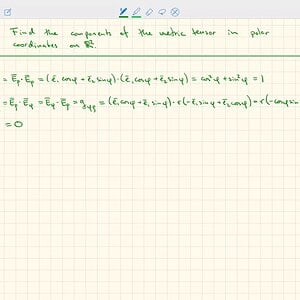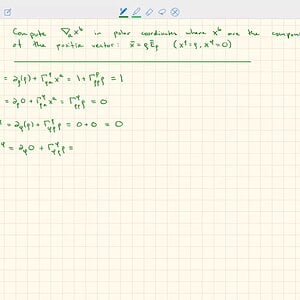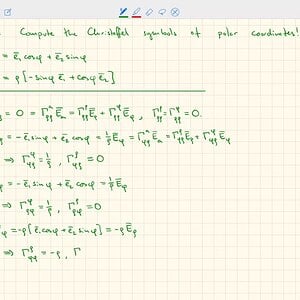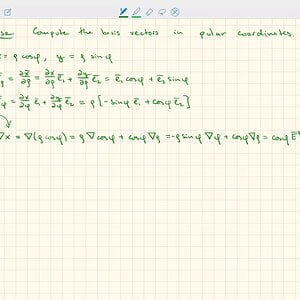Polar coordinates Definition and 569 Threads
-

Trajectory of a particle in polar coordinates
I tried using the formula for acceleration in polar coordinates, but I don't know how to solve the differential equations. How do I solve them? Is there a simpler way to do the problem?- whatever itis
- Thread
- Kinematics Kinematics problem Polar coordinates
- Replies: 18
- Forum: Advanced Physics Homework Help
-

Evaluating integrals, derivatives, etc. with Simpy...
I would like to evaluate expressions with Simpy, but unfortunately I am unable to get a simple answer, the one I would get by hand if I had the time to perform all the computations. As far as I understand, Mathematica does it and yields 4 times the Simpy result, which is a big worry since I wish...- fluidistic
- Thread
- Derivative Integral Polar coordinates
- Replies: 1
- Forum: MATLAB, Maple, Mathematica, LaTeX
-
S
Confusion about variables in polar coordinates
My confusion refers to this question above. If I were to ask you, what is the equation of the radial line, what would you say? I know that the general equation the radial line with cartesian gradient of m has an equation of θ = arctan(m). Clearly here the angle between the radial line and...- sdfsfasdfasf
- Thread
- equation Polar coordinates
- Replies: 2
- Forum: Calculus and Beyond Homework Help
-

Unit vectors that change as a function of time
we can express theta as a product of the angular velocity and time thus plugging this in space of theta in the above equations we can express r hat and theta hat as a function of time. But i am having problems in integrating them and again converting them back to the terms of r hat and theta hat...- tragtf
- Thread
- Clasccal mechanics Polar coordinates
- Replies: 13
- Forum: Introductory Physics Homework Help
-

Deriving ODEs for straight lines in polar coordinates for a given Lagrangian
In polar coordinates, ##x=rcos(\theta)## and ##y=rsin(\theta)## and their respective time derivatives are $$\dot{x}=\dot{r}cos(\theta) - r\dot{\theta}sin(\theta)$$ $$\dot{y}= \dot{r}sin(\theta)+r\dot{\theta}cos(\theta)$$ so the lagrangian becomes after a little simplifying...- Hamiltonian
- Thread
- Euler lagrange equation Polar coordinates
- Replies: 8
- Forum: Introductory Physics Homework Help
-

Help about the unit vectors for polar coordinates in terms of i and j
"Firstly, I represented [Uθ ]on the two-dimensional polar coordinate system to facilitate the steps and projections." Then, I have written the steps, step by step, to ultimately derive the expression U(θ) in terms of i and j which is: [ Uθ=−sin(θ)i+cos(θ)j ] NOTE: The professor provided us...- srnixo
- Thread
- Polar coordinates Unit vectors
- Replies: 13
- Forum: Introductory Physics Homework Help
-
L
Plotting the trajectory of a particle in polar coordinates
Hi, Unfortunately, I am not quite sure whether I have solved/plotted the following task correctly I started by resolving the expression ##\phi=2 \pi t## to t so that I can represent ##\rho(t)## with ##\rho(\phi)## The vector ##\vec{e}_r## was written in my lecture as follows...- Lambda96
- Thread
- Particle Polar coordinates Trajectory
- Replies: 6
- Forum: Advanced Physics Homework Help
-

Optimizing Polar Axis for Dipole in Polar Coordinates
I don't know how to get the result referring to the previous task. Is my decision correct?- DaraRychenkova
- Thread
- Coordinates Dipole Polar Polar coordinates
- Replies: 2
- Forum: Introductory Physics Homework Help
-
R
Graduate Converting this vector into polar form
In the following%3A%20https://pubs.rsc.org/en/content/articlehtml/2013/sm/c3sm00140g?casa_token=3O_jwMdswQQAAAAA%3AaSRtvg3XUHSnUwFKEDo01etmudxmMm8lcU4dIUSkJ52Hzitv2c_RSQJYsoHE1Bm2ubZ3sdt6mq5S-w'] paper, the surface velocity for a moving, spherical particle is given as (eq 1)...- Rodger125
- Thread
- Fluid dynamics Form Polar Polar coordinates Polar form Vector Vector algebra
- Replies: 4
- Forum: General Math
-
H
Graduate Polar Fourier transform of derivatives
The 2D Fourier transform is given by: \hat{f}(k,l)=\int_{\mathbb{R}^{2}}f(x,y)e^{-ikx-ily}dxdy In terms of polar co-ordinates: \hat{f}(\rho,\phi)=\int_{0}^{\infty}\int_{-\pi}^{\pi}rf(r,\theta)e^{-ir\rho\cos(\theta-\phi)}drd\theta For Fourier transforms in cartesian co-ordinates, relating the...- hunt_mat
- Thread
- Derivatives Fourier Fourier transform Polar Polar coordinates Transform
- Replies: 4
- Forum: Differential Equations
-
T
Integration of acceleration in polar coordinates
I made this exercise up to acquire more skill with polar coordinates. The idea is you're given the acceleration vector and have to find the position vector corresponding to it, working in reverse of the image. My attempts are the following, I proceed using 3 "independent" methods just as you...- tent
- Thread
- Acceleration Coordinates Differential equations Integral Integration Polar Polar coordinates Polar equations
- Replies: 24
- Forum: Calculus and Beyond Homework Help
-
SH2372 General Relativity (5X): Metric components in polar coordinates
- Orodruin
- Media item
- Metric tensor Polar coordinates
- Comments: 0
- Category: Relativity
-
SH2372 General Relativity (4X): Covariant derivative of the position vector in polar coordinates
- Orodruin
- Media item
- Covariant derivative Polar coordinates Position vector
- Comments: 0
- Category: Relativity
-
SH2372 General Relativity (3X): Christoffel symbols in polar coordinates
- Orodruin
- Media item
- Christoffel symbols Polar coordinates
- Comments: 0
- Category: Relativity
-
SH2372 General relativity (2X): Basis vectors in polar coordinates
- Orodruin
- Media item
- Basis vectors Polar coordinates
- Comments: 0
- Category: Relativity
-
J
Calculating the partial derivative in polar coordinates
Hello, I am trying to solve the following problem: If ##z=f(x,y)##, where ##x=rcos\theta## and ##y=rsin\theta##, find ##\frac {\partial z} {\partial r}## and ##\frac {\partial z} {\partial \theta}## and show that ##\left( \frac {\partial z} {\partial x}\right){^2}+\left( \frac {\partial z}...- james weaver
- Thread
- Coordinates Derivative Partial Partial derivative Polar Polar coordinates
- Replies: 3
- Forum: Calculus and Beyond Homework Help
-
K
Undergrad Wavefunction in polar coordinates and its bra ket notation
The wavefunction of ##|\psi\rangle## is given by the bra ket ##\psi (x,y,z)= \langle r| \psi\rangle## I can convert the wavefunction from Cartesian to polar and have the wavefunction as ## \psi (r,\theta,\phi)## What bra should act on the ket ##|\psi\rangle## to give me the wavefunction as ##...- Kashmir
- Thread
- Bra ket Coordinates Notation Polar Polar coordinates Wavefunction
- Replies: 14
- Forum: Quantum Physics
-

Graduate Solving Laplace's equation in polar coordinates for specific boundary conditions
Hello everybody, Currently I am doing my master's thesis and I've encountered a physics problem which is very difficult for me to solve. The problem I have is finding equations for the magnetic scalar potential inside and outside a ferromagnetic wire for specific boundary conditions...- Stefan H
- Thread
- Boundary Boundary conditions Conditions Coordinates Laplace's equation Magnetic potential Polar Polar coordinates Specific
- Replies: 3
- Forum: Differential Equations
-

Python Numerical integration over a disk with polar coordinates
In my job, I was given the task of calculating a force that operates an ultrasound transmitter on a receiver. The calculation is made by assuming that each point on the transmitter is a small transmitter and integration should be made on the surface of the transmitter. Since the transmitter is...- uzi kiko
- Thread
- Coordinates Disk Integration Numerical Numerical integration Polar Polar coordinates
- Replies: 5
- Forum: Programming and Computer Science
-

Undergrad Moving center of coordinates in the polar graph
I have a function in polar coordinates: t (rho, phi) = H^2 / (H^2 + rho^2) (1) I have moved the center to the right and want to get the new formulae. I use cartesian coordinates to simplify the transformation (L =...- ektov_konstantin
- Thread
- Center Coordinates Graph Polar Polar coordinates Transformation
- Replies: 2
- Forum: Differential Geometry
-

Graduate Analytical solution for an integral in polar coordinates?
Hi, I am trying to find open-form solutions to the integrals attached below. Lambda and Eta are positive, known constants, smaller than 10 (if it helps). I would appreciate any help! Thank you! -

Deriving the Differential Position Vector in Cylindrical Coordinates
I had an equation. $$T=\frac{1}{2}m[\dot{x}^2+(r\dot{\theta})^2]$$ Then, they wrote that $$\mathrm dr=\hat r \mathrm dr + r \hat \theta \mathrm d \theta + \hat k \mathrm dz$$ I was thinking how they had derived it. The equation is looking like, they had differentiate "something". Is it just an...- Istiak
- Thread
- Differential Differentiation Polar coordinates Position Position vector Vector Vectors
- Replies: 8
- Forum: Introductory Physics Homework Help
-
A
Double integral with polar coordinates
Greetings! I have the following integral and here is the solution of the book (which I understand perfectly) I have an altenative method I want to apply that does not seems to gives me the final resultMy method which doesn't give me the final results! where is my mistake? thank you!- Amaelle
- Thread
- Coordinates Double integral Integral Polar Polar coordinates
- Replies: 5
- Forum: Calculus and Beyond Homework Help
-
D
Undergrad Vector squared in polar coordinates
Hi I was always under the impression that i could write a2 = a.a = a2 Equation 1 where a⋅ is a vector and a is its modulus but when it comes to the kinetic energy term for a particle in plane polar coordinates I'm confused ( i apologise here as i don't know how to write time derivative with...- dyn
- Thread
- Coordinates Polar Polar coordinates Vector
- Replies: 10
- Forum: Differential Geometry
-

Simmons 7.10 & 7.11: Find Curves Intersecting at Angle pi/4
>10. Let a family of curves be integral curves of a differential equation ##y^{\prime}=f(x, y) .## Let a second family have the property that at each point ##P=(x, y)## the angle from the curve of the first family through ##P## to the curve of the second family through ##P## is ##\alpha .## Show...- yucheng
- Thread
- Angle Curves Differential Differential equation Differential equations Polar coordinates
- Replies: 1
- Forum: Calculus and Beyond Homework Help
-

Undergrad Basic question pertaining to Polar Coordinates & how to employ them
I have a question that might be considered vague or even downright idiotic but just wanted to know that once we find out the velocity & acceleration of a body in angular motion in plane polar coordinates, and are asked to integrate the expressions in order to find position at some specified time... -

Incorrect derivation of tangential acceleration in polar coordinates
I am trying to derive the tangential acceleration of a particle. We have tangential velocity, radius and angular velocity. $$v_{tangential}= \omega r$$ then by multiplication rule, $$\dot v_{tangential} = a_{tangential} = \dot \omega r + \omega \dot r$$ and $$a_{tangential} = \ddot \theta r +...- yucheng
- Thread
- Acceleration Coordinates Derivation Dynamics Polar Polar coordinates Rotation Tangential acceleration Vector
- Replies: 4
- Forum: Introductory Physics Homework Help
-

Vector Problem -- Addition of two vectors given in polar coordinates
Doing a review for my SAT Physics test and I'm practicing vectors. However, I am lost on this problem I know I need to use trigonometry to get the lengths then use c^2=a^2+b^2. But I need help going about this.- randomphysicsguy123
- Thread
- Addition Coordinates Polar Polar coordinates Vector Vectors
- Replies: 11
- Forum: Introductory Physics Homework Help
-

Graduate How do I express an equation in Polar coordinates as a Cartesian one.
I got a polar function. $$ \psi = P(\theta )R(r) $$ When I calculate the Laplacian: $$ \ \vec \nabla^2 \psi = P(\theta)R^{\prime\prime}(r) + \frac{P(\theta)R^{\prime}(r)}{r} + \frac{R(r)P^{\prime\prime}(\theta)}{r^{2}} $$ Now I need to convert this one into cartesian coordinates and then...- JorgeM
- Thread
- Calculus Cartesian Coordinates Laplacian Polar Polar coordinates
- Replies: 1
- Forum: Differential Equations
-

Orthogonal trajectories in polar coordinates
there is a problem in a book that asks to find the orthogonal trajectories to the curves described by the equation : $$r^{2} = a^{2}\cos(\theta)$$ the attempt of a solution is as following : 1- i defferntiate with respect to ##\theta## : $$2r \frac{dr}{d\theta} = -a^{2}\;\sin(\theta)$$ 2- i...- patric44
- Thread
- Coordinates Orthogonal Polar Polar coordinates Trajectories
- Replies: 2
- Forum: Calculus and Beyond Homework Help
-
M
Stokes' Theorem 'corollary' integral in cylindrical polar coordinates
Hi, I was just working on a homework problem where the first part is about proving some formula related to Stokes' Theorem. If we have a vector \vec a = U \vec b , where \vec b is a constant vector, then we can get from Stokes' theorem to the following: \iint_S U \vec{dS} = \iiint_V \nabla...- Master1022
- Thread
- Coordinates Cylindrical Integral Polar Polar coordinates Stokes Theorem
- Replies: 6
- Forum: Calculus and Beyond Homework Help
-
W
Undergrad Using polar coordinates to describe rose petals
I encountered a question which asked me to describe the rose petal sketched below in polar coordinates. The complete answer is R = {(r, θ): 0 ≤ r ≤ 6 cos(3θ), 0 ≤ θ ≤ π}. That makes sense to me for the right petal. What about the other two on the left?- Worn_Out_Tools
- Thread
- Coordinates Polar Polar coordinates
- Replies: 5
- Forum: Calculus
-
T
Orbital equations in polar coordinates
The equations of motion are: \ddot{r}-r{\dot{\theta}} ^{2} = -\frac{1}{r^{2}} for the radial acceleration and r\ddot{\theta} + 2\dot{r}\dot{\theta}= 0 for the transverse acceleration When I integrate these equations I get only circles. The energy of the system is constant and the angular...- TimK
- Thread
- Coordinates Numerical integration Orbit Orbital Polar Polar coordinates
- Replies: 5
- Forum: Aerospace Engineering
-
P
Polar coordinates of the centroid of a uniform sector
If I use cartesian co-ordinates, I get: ##\bar{x}=\frac{1}{A}\iint x\, dA=\frac{1}{A} \iint r^2\cos\theta\, dr\, d\theta= \frac{2a\sin\theta}{3\theta}## ##\bar{y}=\frac{1}{A}\iint y\, dA=\frac{1}{A}\iint r^2\sin\theta\, dr\, d\theta= \frac{2a(1-\cos\theta)}{3\theta}## But if I use polar...- parsesnip
- Thread
- Centroid Coordinates Polar Polar coordinates Uniform
- Replies: 5
- Forum: Calculus and Beyond Homework Help
-

Graduate A particle moving with zero radial acceleration in polar coordinates
In the example above, the authors claim that when ##r=r_0e^{\beta t}##, the radial acceleration of the particle is 0. I don't quite understand it because they did not assume ##\beta=\pm \omega##. Can anyone please explain it to me? Many thanks. -

Undergrad Insight into polar coordinates (Newtonian mechanics)?
I am learning to use polar coordinates to describe the motions of particles. Now I know how to use polar coordinates to solve problems and the derivations of many equations. However, the big picture of polar coordinates remains unclear to me. Would you mind sharing your insight with me so that I... -

Calculating Area in Polar Coordinates
$$-2\sin\theta=1\Leftrightarrow\theta=-\frac{\pi}{6},\,-\frac{5\pi}{6}\\ \begin{align*} \int_{-\frac{\pi}{6}}^{-\frac{5\pi}{6}}\frac 12\left(4\sin^2\theta-1\right)d\theta &=\int_{-\frac{\pi}{6}}^{-\frac{5\pi}{6}}\frac 12\left(1-2\cos2\theta\right)d\theta\\...- archaic
- Thread
- Area Coordinates Polar Polar coordinates
- Replies: 10
- Forum: Calculus and Beyond Homework Help
-

Undergrad How to find the length of a vector expressed in polar coordinates?
The velocity of a particle below is expressed in polar coordinates, with bases e r and e theta. I know that the length of a vector expressed in i,j,k is the square of its components. But here er and e theta are not i,j,k. Plus they are changing as well. Can someone help convince me that the... -
K
Undergrad Using polar coordinates in 1-dimensional problems
If I have a physical problem, say, a particle which is constrained to move in the ##y## direction, which means that its ##x## coordinate remains fixed, does it make sense to write ##y## in terms of polar coordinates? That is, ##y = r \sin\theta##. Since now I have two parameters ##r,\theta##...- kent davidge
- Thread
- Coordinates Polar Polar coordinates
- Replies: 3
- Forum: Optics
-

Mechanics Problem using Polar Coordinates
This is what I have so far, please need urgent help. I don't understand and know what to do. For the first part, I got a really long answer, for the second part I am trying in terms of mv^2/r = mg, or mg = m*(answer to first), but I am getting nowhere. PLease help- MathDestructor
- Thread
- Coordinates Mechanics Polar Polar coordinates
- Replies: 13
- Forum: Introductory Physics Homework Help
-

[SR] - Test Particle inside the Sun's Gravitational Field - Part 2
To begin with, I posted this thread ahead of time simply because I thought it may provide me some insight on how to solve for another problem that I have previously posted here: https://www.physicsforums.com/threads/special-relativity-test-particle-inside-suns-gravitational-field.983171/unread...- Athenian
- Thread
- Equations of motion Field Gravitational Gravitational field Particle Polar coordinates Space Special relativity Sr Test
- Replies: 12
- Forum: Introductory Physics Homework Help
-
P
Is the Chain Rule Applied to Spherical Polar Coordinates Different?
Ive found ##\delta x/\delta r## as ##sin\theta cos\phi## ##\delta r/\delta x## as ##csc\theta sec\phi## But unsure how to do the second part? Chain rule seems to give r/x not x/r?- physconomics
- Thread
- Coordinates Polar Polar coordinates Spherical
- Replies: 16
- Forum: Introductory Physics Homework Help
-
A
Integration in polar coordinates
In spherical poler coordinates the volume integral over a sphere of radius R of $$\int^R_0\vec \nabla•\frac{\hat r}{r^2}dv=\int_{surface}\frac{\hat r}{r^2}•\vec ds$$ $$=4\pi=4\pi\int_{-\inf}^{inf}\delta(r)dr$$ How can it be extended to get $$\vec \nabla•\frac{\hat r}{r^2}=4\pi\delta^3(r)??$$- Apashanka
- Thread
- Coordinates Integration Polar Polar coordinates
- Replies: 4
- Forum: Introductory Physics Homework Help
-
A
Double integral with polar coordinates
Hello there, I'm struggling in this problem because i think i can't find the right ##\theta## or ##r## Here's my work: ##\pi/4\leq\theta\leq\pi/2## and ##0\leq r\leq 2\sin\theta## So the integral would be: ##\int_{\pi/4}^{\pi/2}\int_{0}^{2\sin\theta}\sin\theta dr d\theta## Which is equal to...- Archimedess
- Thread
- Coordinates Double integral Integral Polar Polar coordinates
- Replies: 13
- Forum: Calculus and Beyond Homework Help
-
Z
Undergrad Area Differential in Cartesian and Polar Coordinates
The area differential ##dA## in Cartesian coordinates is ##dxdy##. The area differential ##dA## in polar coordinates is ##r dr d\theta##. How do we get from one to the other and prove that ##dxdy## is indeed equal to ##r dr d\theta##? ##dxdy=r dr d\theta## The trigonometric functions are used... -

Graduate Equation of motion in polar coordinates for charged particle
A solution of equations of motion for charged particle in a uniform magnetic field are well known (##r = const##, ## \dot{\phi} = const##). But if I tring to solve this equation using only mathematical background (without physical reasoning) I can't do this due to entaglements of variables...- sergiokapone
- Thread
- Charged Charged particle Coordinates Equation of motion Lorentz force Motion Particle Polar Polar coordinates
- Replies: 14
- Forum: Electromagnetism
-

Graduate Converting Velocity Formula: Polar to Cartesian
I have a little question about converting Velocity formula that is derived as, ##\vec{V}=\frac{d\vec{r}}{dt}=\frac{dx}{dt}\hat{x}+\frac{dy}{dt}\hat{y}+\frac{dz}{dt}\hat{z}## in Cartesian Coordinate Systems ##(x, y, z)##. I want to convert this into Polar Coordinate System ##(r, \theta)##... -
E
Can't work out integral in polar coordinates
I considered the work done by the frictional force in an infinitesimal angular displacement: $$dW = Frd\theta = (kr\omega) rd\theta = kr^{2} \frac{d\theta}{dt} d\theta$$I now tried to integrate this quantity from pi/2 to 0, however couldn't figure out how to do this$$W =...- etotheipi
- Thread
- Coordinates Integral Polar Polar coordinates Work
- Replies: 3
- Forum: Calculus and Beyond Homework Help
-

How to get ##\ddot r## when you have ##r##, ##\theta## and right trig
I have a right triangle: one of the angles is ##60°## (that's ##\theta##), one of the sides is ##40 m## long, and the hypotenuse is equal to the radius. Now I can find an expression for ##r## and that expression is ##r=\frac{height}{sin \theta}##. If I differentiate it, I'll get ##\dot r## and...- Like Tony Stark
- Thread
- Kinamatics Polar coordinates Trig
- Replies: 4
- Forum: Introductory Physics Homework Help



